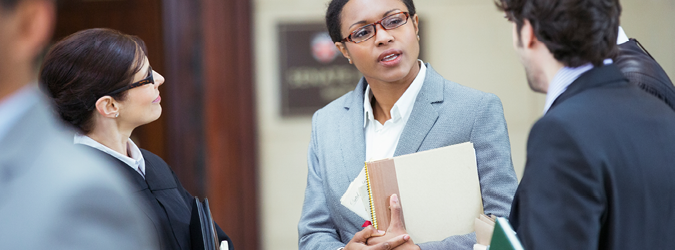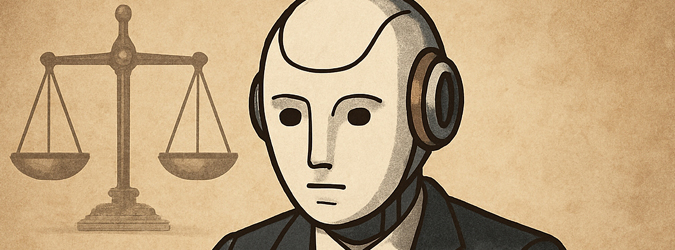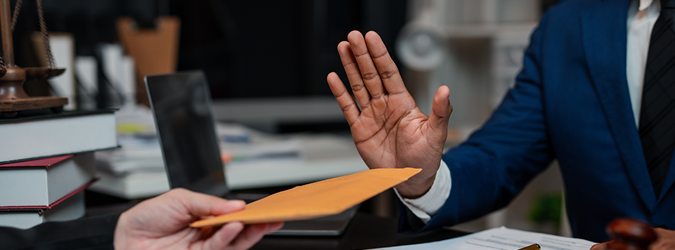Attorney Professional Forum: A Judge Wants a Lawyer To Brief Him on a Topic Outside the Courtroom: Is That Ethical?
9.6.2024
 To the Forum:
To the Forum:
I am a lawyer at a well-known criminal defense firm. I often write articles in legal journals and am quoted as an expert in criminal law in various notable news publications. Recently, while moderating a CLE program about the admissibility of video recordings of police encounters, I realized an old law school classmate of mine – who is now a judge hearing criminal matters – was filling in for one of the panelists who couldn’t make it at the last minute.
After the CLE was over, the judge and I greeted each other, engaged in typical small talk and briefly caught up on each other’s careers since law school. I complimented the judge on his insights throughout the CLE program, and the judge mentioned that he was excited to be a panelist because this topic has come up frequently over the last few years. The judge praised the questions I asked during the panel, stating that I seemed very knowledgeable about the topic. He then asked if I had time in the next few weeks to join him at the social club at which he is a member so that he could further “pick my brain” about the topic over a game of squash. He emphasized how much he would appreciate “learning from a pro” about video recordings of police encounters being used as evidence. I told him I would let him know my availability but that I had a busy few weeks coming up. The truth is, I am hesitant to weigh in on the topic to a judge when it is apparent he currently has a case before him involving this topic.
My question for the forum is, what are the ethical rules surrounding judges asking other attorneys or legal experts about the law? If an attorney is requested by a judge to provide insights about the law, what is the attorney’s ethical responsibility?
Sincerely,
Ivanna B. Wright
Dear Ms. Wright:
Yours is a situation that attorneys often face; put simply, our profession thrives on networking. New York judges are held to a higher standard of ethics than attorneys under the Rules of the Chief Administrative Judge (RCAJ), while the New York Rules of Professional Conduct (RPC) govern your ethical obligations.[1]
Ethical Rules for the Judge
Judges are generally prohibited by the RCAJ from making “any public comment about a pending or impending proceeding in any court within the United States or its territories.” While judges certainly are expected to know a lot about the law, they cannot possibly know everything, and so they are permitted to seek advice when necessary and certain rules proscribe how they may do so. Generally, Section 100.3(B)(6) of the RCAJ prohibits judges from “initiat[ing], permit[ting], or consider[ing] ex parte communications, or consider[ing] other communications made to the judge outside the presence of the parties or their lawyers concerning a pending or impending proceeding.” According to Comment [3.4][3B(6)(e)] of the New York State Bar Association’s Code of Judicial Conduct,[2] “the proscription against communications concerning a proceeding includes communications from lawyers, law teachers and other persons who are not participants in the proceeding, except to the limited extent permitted.”
Section 100.3(B)(6)(b) of the RCAJ outlines one instance in which such communication may be permitted, allowing such communications only when notice is given to the parties: “a judge may obtain the advice of a disinterested expert on the law applicable to a proceeding before the judge if the judge gives notice to the parties of the person consulted and a copy of such advice if the advice is given in writing and the substance of the advice if it is given orally, and affords the parties reasonable opportunity to respond.” Nearly identical language is outlined in Rule 2.9(2) of the American Bar Association’s Model Code of Judicial Conduct.[3]
A comment to this rule provided in NYSBA’s Code of Judicial Conduct states that “an appropriate and often desirable procedure for a court to obtain the advice of a disinterested expert on legal issues is to invite the expert to file a brief amicus curiae.” Comment [5] to the ABA Model Rule 2.9[4] allows a judge to “consult with other judges on pending matters,” so long as they “avoid ex parte discussions of a case with judges who have previously been disqualified from hearing the matter, and with judges who have appellate jurisdiction over the matter.”
You could start with some due diligence by checking the judge’s docket and try to determine whether this might be a “live issue.” This could help give the judge the benefit of the doubt that he is not approaching you inappropriately. Assuming arguendo that this issue of video recordings is before the court, the judge would be in clear violation of these rules even though he didn’t expose the name of the case to you. He would have to give notice to each of the parties that he was asking your expert advice and provide the substance of the advice to the parties, allowing the parties a reasonable opportunity to respond to such advice.
Judges can’t ask just anybody for advice on a pending proceeding, only a disinterested expert. Being that you are an expert in criminal law and you may be a disinterested party, the judge likely would have been able to obtain your advice on the matter had he abided by the proper procedure proscribed by the rules discussed above.
Ethical Responsibilities of the Attorney
In our view, you are not required to report the judge’s conduct at this time based on the facts presented, considering RPCs 3.5 and 8.3, but may be expected to cooperate should the judge later come under investigation.
RPC 3.5[5] governs the impartiality of tribunals and jurors. Section (a)(2) states that lawyers shall not “in an adversarial proceeding communicate. . . as to the merits of the matter with a judge or official of a tribunal or an employee thereof before whom the matter is pending.” Comment [2] to this rule explains: “Unless authorized to do so by law or court order, a lawyer is prohibited from communicating ex parte with persons serving in a judicial capacity in an adjudicative proceeding, such as judges, masters or jurors, or to employees who assist them, such as law clerks.”[6]
However, this rule aligns more in cases where the attorney has made an appearance and where the lawyer communicates with the presiding judge outside the presence or knowledge of opposing counsel(s).
RPC Rule 8.3[7] governs a lawyer’s duty to report professional misconduct. Subsection (a) requires that lawyers report knowledge of another lawyer who committed a violation of the RPC that would raise “a substantial question as to that lawyer’s honesty, trustworthiness or fitness as a lawyer.” This rule is somewhat unclear as to whether this duty also applies to judges, as subsection (b) states that “a lawyer who possesses knowledge or evidence concerning another lawyer or a judge shall not fail to respond to a lawful demand for information from a tribunal or other authority empowered to investigate or act upon such conduct.” This subsection seems to imply that lawyers do have a duty to report misconduct of a judge if demanded by a tribunal or other investigative authority. However, subsection (a) does not reference judges.
Comment [1] seems to offer some clarity, stating “self-regulation of the legal profession requires that members of the profession initiate disciplinary investigation when they know of a violation of the Rules of Professional Conduct. Lawyers have a similar obligation to cooperate with authorities empowered to investigate judicial misconduct.” While this duty to report judicial misconduct is buried within the comments of the RPC, it makes clear that lawyers do have a duty to maintain the integrity of the profession by reporting wrongdoers. However, it seems to limit the lawyer’s obligation to reporting judicial misconduct to instances where he or she might be required to cooperate with an ongoing investigation into a judge’s conduct. It does not appear to require a lawyer to initiate a disciplinary investigation of a judge.
According to Ethics Opinion 1099[8], RPC 8.3 does not impose an obligation to report alleged judicial misconduct, because it does not explicitly refer to judges in the language of the rule. In the words of its authors, “had the drafters [of the RPC] intended the duty to report to include conduct by a judge that violates the Rules of Judicial Conduct, they easily could have said so.” They go on to explain that since Rule 8.3(a) does not refer to judges and Rule 8.3(b) does, this suggests an “intention not to impose an obligation to report alleged judicial misconduct.”[9]
It is also mentioned that the courts decided not to accept the recommendation to include the duty to report judicial misconduct “that raises a substantial question as to the judge’s fitness for office” when adopting the RPC. According to the ethics opinion, New York is one of three states that does not address whether a lawyer has an obligation to report judicial misconduct. Thus, as Ethics Opinion 1099 concludes, a “New York lawyer has no duty, at risk of disciplinary sanction, to report a violation by a judge of the Rules of Judicial Conduct.” However, a lawyer is free to report judicial misconduct if he or she chooses so long as reporting such conduct would not violate the lawyer’s duty of confidentiality under RPC 1.6.
So, while you may have a duty under the RPC to report other lawyers’ misconduct, you are under no obligation to report the judge’s potential misconduct here. However, if the judge comes under investigation at some point, and you are questioned or asked to give information about the judge by a tribunal or other investigative authority, you may have a duty to report such information under Rule 8.3(b).
New York State Commission on Judicial Conduct
Fortunately, the need to report judges is not something that happens to us every day, and we expect that you may be wondering how does one report a judge? In the State of New York, the Commission on Judicial Conduct[10] investigates reports of ethical misconduct by judges. The commission has the authority to investigate an array of issues including, but not limited to, “serious failure to treat litigants, attorney, or court personnel with respect; conflicts of interest, including financial or social relationships with litigants or attorneys,” as well as “using the judge’s title to obtain private benefits for the judge or others; lengthy and unexcused delay in rendering decisions; and other unethical behavior on or off the bench.”
The commission accepts reports via formal complaints that can be filed online or mailed along with copies of any supporting documentation. The commission urges complainants to file their complaints as soon as possible as delays could “affect [its] ability to do a complete investigation.” The commission even allows complaints to be submitted anonymously; however, this may complicate the investigation as the commission is unable to contact the complainant for additional information about the report.
Once a complaint is filed, the commission will decide “whether to investigate or dismiss the complaint.” If an investigation is commenced, a staff attorney will be assigned to the matter who might interview witnesses, review court records and obtain a statement – either written or via testimony under oath – from the judge being accused. If the investigation is conclusive, the commission will “serve the judge with a Formal Written Complaint containing specific charges of misconduct.” A formal hearing and report of findings would then follow.
Reporting a judge to the commission can be a lengthy process, and a successful complaint requires supporting evidence. In your case, it seems you have removed yourself from a situation where the judge could truly cross a line before it happened. While you certainly may file a complaint with the commission, keep in mind that reporting a judge for ethical misconduct is a serious matter and the commission will require supporting evidence in order to launch an investigation and not merely dismiss a complaint.
The Forum by:
Jean-Claude Mazzola (jeanclaude@mazzolalindstrom.com)
Hanoch Sheps (hanoch@mazzolalindstrom.com)
Katie O’Leary (katie@mazzolalindstrom.com)
Vincent J. Syracuse (syracuse@thsh.com)
Endnotes
[1] https://ww2.nycourts.gov/rules/chiefadmin/index.shtml.
[2] https://nysba.org/wp-content/uploads/2020/02/CJC-1.pdf.
[3] https://www.americanbar.org/groups/professional_responsibility/publications/model_code_of_judicial_conduct/model_code_of_judicial_conduct_canon_2/rule2_9expartecommunications/.
[4] Id.
[5] https://nysba.org/wp-content/uploads/2022/07/Rules-of-Professional-Conduct-as-amended-6.10.2022-20220701.pdf.
[6] Id.
[7] Id.
[8] https://nysba.org/ethics-opinion-1099.
[9] Ethics Opinion 1099 also addresses the fact that “judges are invariably lawyers, which invites the possibility of interpreting Rule 8.3(a)’s reference to the conduct of ‘another lawyer’ to include judges.” In the fact pattern it was asked to analyze, the drafters assumed for purposes of its opinion that the judge’s conduct did not violate the RPC. However, it does not rule out the inference that because judges are lawyers, they are also bound by the RPC.
[10] https://cjc.ny.gov/FAQ.html#EthicalMisconduct.
Question for the Next Attorney Professionalism Forum
To the Forum:
I am a recent law school graduate who was admitted to practice just a few weeks ago. I began my first job as a lawyer soon after taking the bar exam at a small family law firm in New York City that participates in a lot of pro bono work. Being that the firm takes many pro bono cases, my salary is relatively low compared to others of my law school peers who are working at bigger firms. I very much enjoy my work and my firm but have found it very hard to make ends meet with my first-year associate salary and the current state of the economy. I do not want to quit for a higher paying job, but I have come very close to being unable to afford the rent for my modest New York apartment and necessities like groceries.
Throughout law school, I was a server and bartender at a restaurant, which I found to be very lucrative. That job helped me pay for housing during school and all of those expensive textbooks. I decided a few weeks ago to start looking for serving and bartending jobs again for my time outside of work at night and on the weekends to help me feel a bit more comfortable financially while allowing me to continue working at my current firm. However, I recently came across an article about an attorney being sanctioned for moonlighting as a document reviewer for another company and now I am worried.
My question for the forum is: what are the ethical rules surrounding attorneys working multiple jobs? Are attorneys bound to one job and firm at a time or are they allowed to work second jobs so long as they are not related to the practice of law?
Warmly,
Mona Leighton






